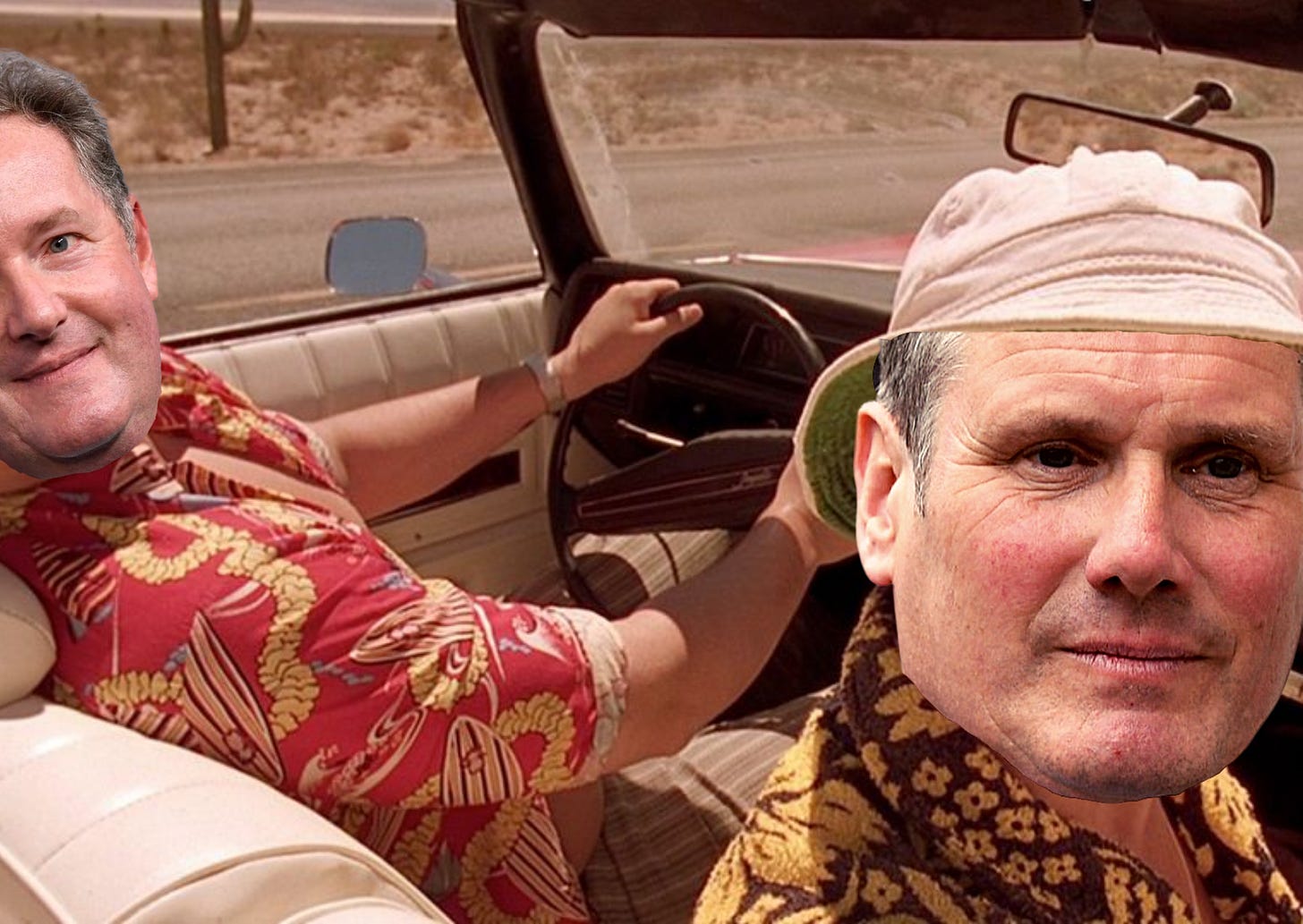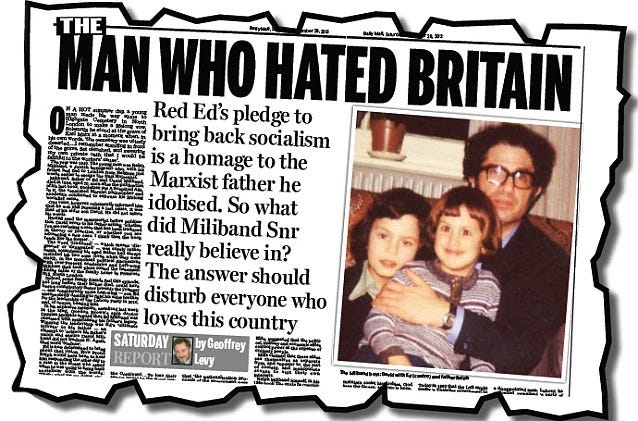Keir & Loathing in the Labour Party: A Starmer documentary will only embarrass him more
The history of Leaders of the Opposition allowing cameras to capture behind-the-scenes footage is... not good.
“Keir Starmer is just a bloody bloke, you know? Don’t believe me? Here’s a picture of him playing Seven-a-Side. And one of him chugging a pint. And another one. And another one. Think Nigel Farage loves beer? Keir could drink him under the table, like a bloody bloke. Not convinced? We’re doing a documentary!”
Henry Zeffman, The Times’ chief political correspondent, and Patrick Maguire, the editor of its Red Box political email and blog, broke the story yesterday that Team Starmer is in talks with a production company about producing a show about the Labour Leader:
Sir Keir Starmer is considering starring in a fly-on-the-wall documentary as he tries to revive his faltering leadership of the Labour Party.
A production company is in talks with Starmer about trailing him for a television show narrating the experience of being leader of the opposition, The Times understands.
Broadcasters have been asked whether they would be interested in the programme, which some Labour sources believe could be a highly effective way to broadcast Starmer’s personality to a larger slice of the electorate.
One of the assumptions there is that Starmer has a personality, rather than a collection of focused grouped opinions, an expensive suit, and a sign that reads “I locked up baddies”.
The even more damaging assumption is that behind-the-scenes documentaries do anything positive for opposition leaders, especially as they are rarely watched by anyone beyond an audience of political obsessives and odballs1.


The plan — if indeed it’s actually being worked on — suggests Starmer’s team are still focused on trying to rebuild the Red Wall and reach older voters who will turn on their televisions in the first place. Young voters aren’t watching much live TV and when they do, it’s not to catch political documentaries about people who seem to hate them.
On Times Radio2 yesterday, Daniel Finkelstein, an advisor to William Hague when he was Tory leader and Leader of the Opposition, reflected on the making of Michale Cockerell’s How to be Leader of the Opposition (1999). He recalled:
You have to be so careful what you say. Someone said something hugely embarrassing on the first day of filming with Michael Cockerell and we had to ask him to take it out in exchange for the rest of the access. It becomes a bit of a nightmare, you’re watching everything to make sure you don’t say anything half-arsed… I’m not sure it’s worth all the effort.
Hague, in fact, did two documentaries — with one for Channel 4 going out before Cockerell’s effort on the BBC. Finkelstein continued:
The chances of it producing a bad story are high. We’d all like to think: ‘If only someone could come and see me behind-the-scenes… they’d fall in love with me instantly.’ That isn’t necessarily the case. I don’t think it’s likely to be a calamity, but it’s quite a nuisance.
[In the first documentary] they filmed [William Hague] preparing for Prime Minister’s Questions and for months Blair knew exactly what we were going to do and we had to change the whole technique… because we’d filmed the whole thing, giving away all out secrets.
While Finkelstein was surprisingly kind about Starmer’s prospects in producing a documentary, especially given he’s a Conservative peer and Times columnist, the rats at The Daily Telegraph are already gnawing at the cables.
Former Labour MP, Telegraph columnist, and professional turncoat Tom Harris writes there under the headline The problem with 'Starmer: The Movie'? Its leading man:
So what is his USP? What is it about Starmer that a documentary crew will reveal to the gaze of an excited public that we haven’t yet seen?
We are drawn to one conclusion, but it is a messy and unsatisfactory one: he was not Corbyn. The reason this is messy and unsatisfying is that it was hardly unique to Starmer. He was also the only male candidate for the post, but even the Labour Party is beyond such misogyny these days.
That is just a taster of the criticism that will crash over Starmer if he makes the documentary. Most people won’t watch the show — outside perhaps the judicious nuggets grabbed by Gogglebox — but they will see the newspaper commentary on it and take in second-hand analysis of it on Good Morning Britain and the Today programme.
The Daily Mail’s crack team of pause button pressers will find the moments that Starmer looks most stupid and winkle out his version of Ed Miliband’s ‘bacon sandwich moment’.

I can picture Team Starmer now in a Thick of It style planning meeting, running through the things he shouldn’t wear (baseball caps, t-shirts, trainers that look like he’s trying to be Cool Dad™) and the food items that are definitely off the menu. In fact, should he just not eat at all? But then won’t he seem more like an android than he already does?
In Cockerell’s documentary, alongside cameos from Jimmy Saville and the aforementioned Lord Finkelstein — not in the same scenes I must add — there are several appearances by George Osborne, then a speechwriter and political secretary to Hague. Tom Harris quotes him in his piece:
Former foreign secretary William Hague is probably right about such exercises: while flattering to the subject, at best they make no difference to the public’s perception of him. Former chancellor George Osborne was rather more dismissive: “It did mean we had two months of fake meetings on camera pretending to be nice about everyone.”
And it’s true that in the documentary Osborne and other assorted advisors and hangers-on do come off like a bunch of animatronic mannequins from a men’s outfitters that caters only to chinless Home Counties non-entities.
Starmer, recently stripped of the flattering rumour that he was the basis for Mark Darcy in the Bridget Jones novels by their creator Helen Fielding, is not a well of hidden charisma. If his team do decide to go ahead with a documentary there’s a high chance that it will simply reveal that he is, in fact, more boring and awkward than previously suspected.
Labour’s 1987 party political election broadcast, Kinnock: The Movie, has cast a long shadow, despite the fact that it did little — if anything — to help Labour’s chances. Kinnock comes over well in the film — created by the Oscar-winning director Hugh Hudson who had been drafted in by Peter Mandelson to do the job — because he is a charismatic speaker. Starmer isn’t — he often sounds like a nervous estate agent presenting the monthly figures to a room full of other estate agents.
Molly Dineen’s 10-minute mini-biopic of Tony Blair felt authentic and took six months of filming and tinkering to give that impression. It’s hard to see it now, in the age of mullet-wearing, war-crimes denying, globe-trotting friend to despots Blair, but the young version in that political broadcast seemed fresh. He could still put on the “pretty straight sort of guy” act then.
But Keir Starmer often comes off as a Blair tribute act, as ludicrous as a timber heavy bloke in a rhinestone jumpsuit gyrating in the backroom of a pub trying to summon the spirit of Vegas-era Elvis.
Behind-the-scenes with Blair worked because New Labour’s campaign was already working and he’d already done his dark deal with Rupert Murdoch.
In 2015, Ed Miliband: A Portrait aka “Miliband: The Movie” — created by Hollywood director Paul Greengrass — didn’t work because the media was already set on presenting the Labour leader as an Ardman animations creation gone rogue, a man you couldn’t trust with a bacon sandwich let alone Britain.
And while the party political broadcast showed the truth of Miliband’s family background, The Daily Mail had already got its kick in with the despicable ‘Man Who Hated Britain’ article on his dad.
Vice’s Jeremy Corbyn documentary The Outsider came out in 2016, a year after he was elected Labour leader, and showed nothing that supporters and critics alike didn’t already know. There was no hidden Jeremy Corbyn.
Before the documentary — if it happens — Starmer is going to appear on Piers Morgan’s Life Stories. He’ll be the first party leader to prostrate himself in front of the Meghan-obsessed toilet troll since Gordon Brown in 2010.
The press release for Starmer’s appearance on Life Stories promises:
This hour-long episode of Piers Morgan’s Life Stories, which will be filmed next month [June], is the first interview with a party leader on Life Stories since Piers interviewed Gordon Brown when he was Prime Minister, in 2010.
The episode will see Sir Keir reflect on his childhood in Surrey as the second of four children. His stellar career in law – which earned him a knighthood. His family life and move into politics, culminating in his appointment as Labour leader in April 2020. And how Sir Keir has spent the last year leading his party in lockdown from his spare room.
The political calculus is obvious and clumsy. Starmer wants to get ITV viewers onside and thinks a personal interview will do that. It’s risky at best. Getting sympathy from voters rarely translates to votes.

Just look at how Brown’s appearance on the show was written up by The Guardian of all places:
Was the interview – broadcast for Piers Morgan's Life Stories on ITV – a disaster? No. Was it a game-changer? Probably not. Even when he looks and sounds relaxed, giggly even, Brown finds it hard to connect emotionally.
He revealed little about Tony Blair ("There were disagreements") or what Morgan called his "Mick Jagger-esque" student days ("I've never touched cannabis"). More Jedward than Susan Boyle.
Even Morgan's playful attempt to make the then-chancellor's proposal to Sarah Macaulay "on a wild Scottish beach" in 2000 sound like "Darcy stuff" (did he mean the brooding Heathcliff?) came across like something from the Downing Street news grid. The weather wasn't great. They held hands. He said "I want to get married soon and we should get married soon, please." She said yes, "thankfully". He felt "great". But to avoid media leaks he had the ring sent from America.
And who can forget the time Morgan manoeuvred Nick Clegg into a guileless admission that he had slept with “not more than 30 women”, a confession that is still being quoted in profile pieces to this day.
At 41 minutes into Cockerell’s documentary on the perils of opposition, his narration comments “It may be that you personally are a problem for the voter…” Then Neil Kinnock says something that should serve as a warning to Starmer:
One of the reasons that made them eventually put their cross beside the Conservative candidate was this innate feeling… that they couldn’t see me as Prime Minister. Even highly-articulate voters can’t be explicit about it, it’s just there in the biochemistry as it were.
Starmer needs to stand for something before he can stand up a documentary. And even then, that might not be enough.
I count myself within this category.
Yes, I continue to periodically tune in to that cursed station meaning I probably account for about 2% of the total listenership.




